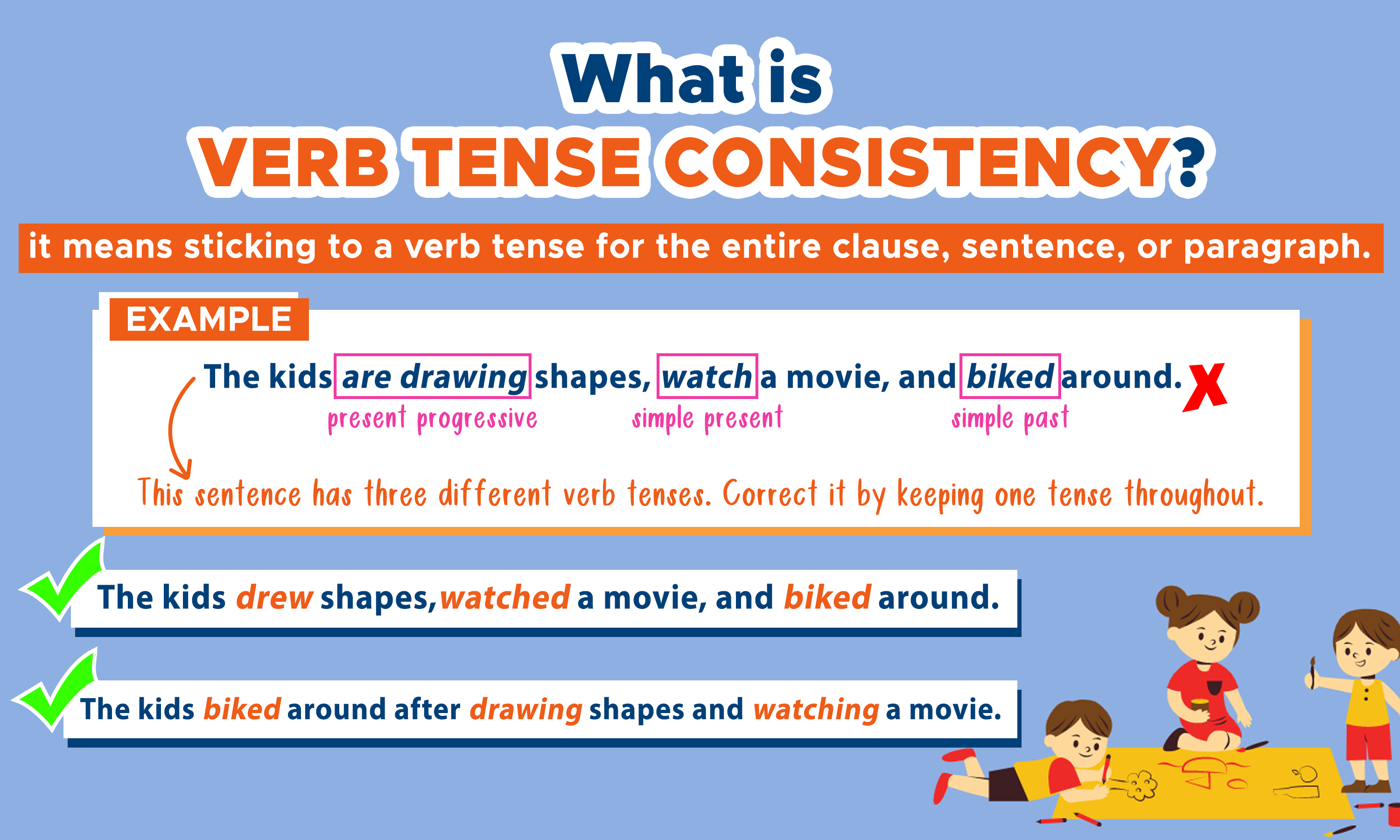What is Verb Tense Consistency?
Verb tense consistency means sticking to a verb tense for the entire clause, sentence, or paragraph. Do not shift tenses unless necessary and appropriate.
Take this sentence with confusing and inconsistent verb tense, for example:
- Michelle painted her room red, arranges her closet, and will wash the car.
The verb painted is in the past tense, while arranges is in the present tense and will wash in the future tense. This sentence is hard to understand. Revise it and keep one tense throughout.
Both sentences below are correct: - Michelle painted her room red, arranged her closet, and washed the car.
- Michelle painted her room red, arranged her closet, and she will also wash the car later.
In the last example, the shift to future tense (will wash) is clear and appropriate because it’s a part of another clause (subject: she, verb: will wash) that expresses a new thought.

Related Reading: Subject Verb Agreement – Match Your Words
Verb Consistency on Sentence Level
Here are more examples of erratic verb tenses (in bold) and their corrected versions:
EXAMPLE: Hayley lives in the basement of her parents while she looked for an apartment.
“Lives” is in the present tense, referring to an ongoing action. “Looked” is in the past, so to make the tense consistent, change “looked” to its present tense.
CORRECTED: Hayley lives in the basement of her parents while she looks for an apartment.
EXAMPLE: Last year, Mitch adopted Lily, Cam gets a new job as a football coach, and Phil has bought a new car.
The adverb “last year” requires a past tense, so revise the verbs “gets” and “has bought” into their simple past tense.
CORRECTED: Last year, Mitch adopted Lily, Cam got a new job as a football coach, and Phil bought a new car.
Verb Consistency on Paragraph Level
Here’s an example of a paragraph with inconsistent verb tenses (in bold). Notice how confusing they are.
Yesterday, Rem and Lina went for a jog. Halfway through their course, the two come across a newly opened bakery where they buy three boxes of cookies. So, instead of jogging as planned, they have consumed the creamy chocolate cookies while walking home. Rem says they will try a different route next time to jog without being tempted by freshly baked goodies.
Here’s a revision that maintains the past tense:
Yesterday, Rem and Lina went for a jog. Halfway through the course, the two came across a newly opened bakery where they bought three boxes of cookies. So, instead of jogging as planned, they consumed the creamy chocolate cookies while walking home. Rem said they would try a different route next time to jog without being tempted by freshly baked goodies.
Keeping one verb tense helps with clarity, specifically in understanding the definite time frame of the actions being narrated. However, there are times when shifting tense is crucial to the meaning of our written piece. Let’s talk about that next.
When to Change Tenses
Shift tenses to indicate a change in the time frame of your clauses, sentences, or paragraph. Be careful to use the proper tense that gets your message across.
Look at how these sentences apply a correct tense change.
EXAMPLE: Luke loves spending time with his sisters, who taught him how to drive.
“Loves” is present tense, meaning it’s an ongoing action; “taught” is past, which refers to a completed action before the current time. The shift in tense is justified.
EXAMPLE: Anne will need your support once she decides to marry Rob.
“Will need” is future tense, describing an action that is yet to occur; “once she decides” is a conditional statement that refers to a current time frame, meaning the action of deciding comes first before the action of supporting.
EXAMPLE: Kacy had reached home before she realized her keys were at the office.
“Had reached” is past perfect, referring to an action completed before something else; “realized” is in simple past, meaning Kacy was already home before she realized her keys were not with her.
Changing Tense in Paragraphs
Here’s an example of a present narration with clear and effective tense change:
By the time Dave graduates from college, Grandma will have turned 85. He is currently taking up Architecture, which Grandma inspired him to pursue. She has always been telling Dave that he will achieve great things if he has the courage, passion, and faith to reach them. We hope that she lives a long, healthy life to see her only grandson grow up.
In this piece, the future perfect verb “will have turned” follows the present tense of the verb “graduates,” while the simple past verb “inspired” indicates a previous action but doesn’t conflict with the story’s overall tense (i.e. present tense). The present progressive verb “has been telling” shows the action began in the past and continues to the present. “Will achieve” is in the simple future tense as it refers to future action. In conclusion, shifting tenses in this particular story proves necessary for clarity.
Thank you for reading. We hope it’s effective! Always feel free to revisit this page if you ever have any questions about verb tense consistency.

